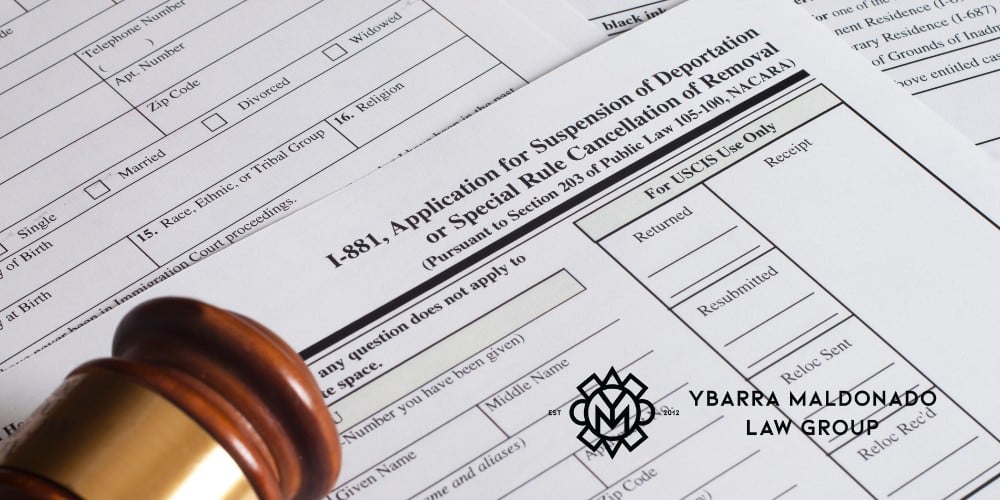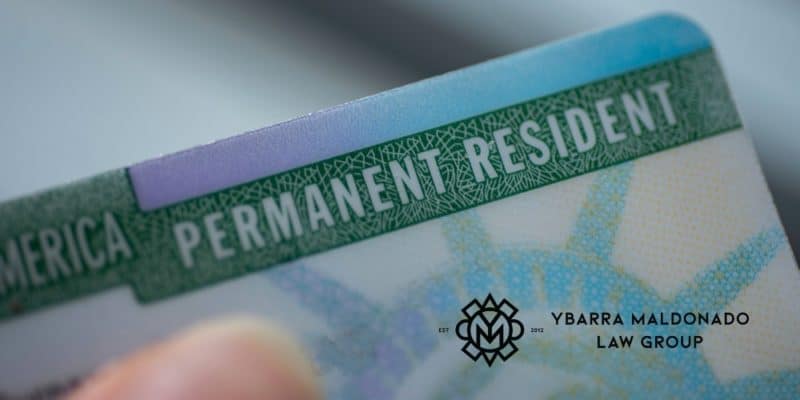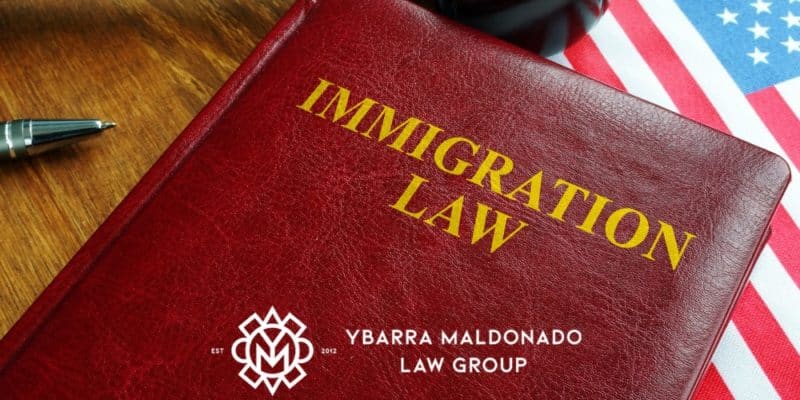CANCELLATION OF REMOVAL
DON’T HESITATE TO REACH OUT TO US!
Our Law Firm is committed to becoming the best Law Firm for Latino, migrant, and Spanish speaking communities in Arizona.
Arizona's Response to DACA

Did you know that you can be deported even if you are a legal permanent resident (green card holder) of the United States? The government can remove you from the country for breaking immigration laws or for being convicted of certain crimes. There is an avenue to remain if you are in this situation. It’s called cancellation of removal.
When an immigration judge orders the removal of an immigrant living within the U.S., it’s called deportation. Deportation happens when an individual violates the law. An immigrant may be deported up until they complete the entire naturalization process and become an official U.S. citizen.
Serious legal consequences accompany an official order of deportation. These may include being barred from the U.S. for five to ten years or indefinitely.
That’s a long time. If you, a relative, or a friend receive an order of removal, you’ll need an experienced Phoenix immigration attorney. The caring legal team at Ybarra Maldonado Law Group understands how devastating and terrifying the thought of deportation may be. That’s why our deportation defense attorneys dedicate themselves to securing our clients’ futures. We can assist you in staying in the U.S.
Why Are Deportation Proceedings Started?
The government can issue deportation orders to immigrants for various reasons. According to the law, immigrants risk deportation for violating immigration laws or any other U.S. law. You can also be barred from entering the United States for committing crimes involving moral turpitude (CIMTs).
The categories of immigrants eligible for deportation are outlined in the Immigration Nationality Act §237. The categories include:
- Criminal Acts
- Documentation Fraud
- Drug Crimes
- Firearms Crimes
- Fraudulent Marriages
- Overstaying a visa
- Risk of becoming a Public Charge
- Security Issues
- Smuggling
While this list contains offenses that are apparent violations, small mistakes, or non-violent acts, may put an immigrant at risk for removal as well. Some examples include registering to vote or voting in a U.S. election or failing to change your official address with the U.S. Citizenship and Immigration Services if you move. Some of these issues are minor, however. After a small technical violation, you may benefit from prosecutorial discretion, which allows you to stay in the country.
What is Cancellation of Removal?
Also known as a waiver of deportability, cancellation of removal is a benefit available to lawful permanent residents (LPR) and non-lawful permanent residents. It allows them to apply to have their status adjusted from a deportable alien to a lawful permanent resident by an immigration judge. An applicant must meet specific criteria before the cancellation of relief is granted.
Cancellation of removal is an option only available to those facing removal.
For non-lawful permanent residents, cancellation of removal is a defense against deportation. This option is also a means of attaining a green card for persons experiencing deportation proceedings.
Until someone is a citizen of the U.S., they are not safe from deportation. Green card holders may still face removal proceedings and possible deportation. A common way lawful permanent residents find themselves in this frightening situation is through being convicted of certain crimes. This makes a person deportable from and inadmissible to the U.S.
Cancellation of removal is a one-time-only method to stop the deportation. You must apply while your deportation process is underway. If you’re already deported, this is not an option.
There is also the possibility of cancellation of removal for survivors of domestic violence committed by a parent or spouse and persons applying for the benefit under the Nicaraguan Adjustment and Central American Relief Act (NACARA).
Relief From Deportation
Lawful permanent residents of the U.S. who have lived here for a long time and meet other criteria may be able to avoid deportation. The following options are available if the requirements are met:
This option applies to those with green cards who have had them for a minimum of five years. A judge will make sure you obtained your card legally.
If you were ineligible for a green card or obtained a card through fraudulent means, cancellation of removal is not possible.
Lawful permanent residents must maintain a continuous physical presence within the U.S. for seven years after being admitted into the country with any status. The seven years must be achieved before the “stop-time rule” begins.
The stop-time rule goes into effect when:
- You receive a Notice to Appear in Immigrant Court
- A crime is committed that goes against the Immigration and Nationality Act I.N.A. §212(a)(2)
- You commit a security offense or other similar crime per I.N.A. §237(a)(4)
The charges against you are listed in the Notice to Appear. These are the reasons you are now deportable or inadmissible to the U.S. The “timer” counting your time in the U.S. stops running once the government files the notice in Immigration Court. For cancellation of removal, you must have lived in the U.S. for at least seven years before your time stopped.
Your clock may also be stopped if you commit a crime involving moral turpitude, controlled substances, or security offenses. I.N.A. §212(a)(2) and §237(a)(4) list the eligible crimes. Your clock stops when you commit the crime and may keep you from reaching the seven-year requirement.
Immigrants with non-LPR status must meet live within the U.S. continuously for a period of ten years. You begin accruing this time as soon as you’re admitted into the country. The timer stops when a Notice to Appear is issued for you. This is the document that begins your proceedings in immigration court.
You can prove your physical presence by providing documents that prove you lived in the U.S. during this period. This includes tax returns, children’s birth certificates, mortgages or lease documents, employment records, bank statements, and more.
You must prove that if you left the U.S., it was not for more than 90-days for one trip and no more than a total of 180 days.
Read Also: Ask Julianna: 10-Year Continuous Presence
There must be no aggravated felony convictions on your criminal record. An aggravated felony is a crime that typically carries a sentence of more than one year, although exceptions exist.
Immigration law often severely punishes this type of crime with more than just deportation. Immigrants may be ineligible for immigration relief, such as most removal waivers. If caught re-entering illegally, they may also be permanently barred from the U.S. and receive enhanced prison sentences.
Please note that even if certain criminal offenses are not considered aggravated felonies under federal or state law, they may be regarded as so under immigration law.
Examples of Aggravated Felonies
- Burglary or theft (at least one year prison term)
- Child pornography
- Fraud
- Money laundering
- Murder
- Prostitution
- Rape
- Smuggling aliens
- Drug trafficking crimes
- Violent crimes (at least one year prison term)
Moral Turpitude Crimes
Often aggravated felonies and Crimes Involving Moral Turpitude (CIMT) overlap. These types of crimes are considered morally reprehensible or involve shocking behavior.
Whether ill intent motivated the conduct/act typically determines whether an offense is a CIMT. Fraud, rape, robbery, and murder are among the crimes considered CIMT.
Cancellation of removal is a benefit that an individual may only use once. Any lawful permanent resident or non-lawful permanent resident who has previously received relief is ineligible.
Under immigration law (I.N.A. §101(f)), the definition of good moral character (GMC) is character exhibited by the average citizen living in the community where the person lives.
A person who applies for cancellation of removal must show GMC for the previous ten years. The clock for these ten years does not stop once the individual receives a Notice to Appear.
Immigration judges decide whether a person has GMC. However, immigration law details negative factors that do not establish GMC. This includes:
- 2+ gambling offense convictions
- Aggravated felony conviction
- Any conviction with an aggregate prison term of 180 days or more
- Earning primary income through illegal gambling activity
- Fraud or false testimony
- Habitual drunkenness
- Participation in acts of torture, genocide, or persecution
An immigration judge may consider any positive factors of GMC, such as volunteer community service or rehabilitation.
Read Also: Ask Julianna: Criminal Bars to Cancellation of Removal & Good Moral Character
For a Non-LPR cancellation of approval application, the hardship experienced must be exceptional and extremely unusual. This means that economic hardship alone will not be enough.
In addition, the hardship that deportation brings must not apply to you. Instead, it must apply to a qualifying relative. Qualifying relatives include a U.S. citizen or an unmarried LPR child under the age of 21, an LPR spouse from a genuine marriage, or an LPR parent or step-parent.
Persons applying for non-LPR cancellation of removal who do not have a qualifying relative do not meet the eligibility requirements for hardship relief. Your Phoenix immigration attorney can help if you have a hardship with a non-qualifying relative. Your legal team can craft a strategy directly or indirectly linking the hardship with a relative who does qualify.
Factors taken into consideration about the qualifying relative when evaluating a hardship application include:
- Their age
- How long they have lived in the U.S.
- Health status
- Loss of financial support if deportation occurs
Language barriers, education opportunities, availability of medical care or medicines, and the standard of living in the country of origin are also considered.
The strategy used in your case is critical to proving a hardship and winning your deportation defense case.
Read Also: Ask Julianna: Extremely Unusual Hardship
Other Types of Relief
It can be hard to meet the requirements for a successful cancellation of removal case. There are other options available that your attorney may go over with you. Among them are:
This is an option available to persons who endured persecution or may be in danger of future persecution in their home country. It includes persecution based on political opinion, race, nationality, religion, or membership in a particular social group. Government persecution applies as well.
It may be necessary to undergo a reasonable or credible fear interview.
To qualify for this option, immigrants must meet eligibility requirements that include:
- You endured battering or extreme cruelty from a U.S. citizen or LPR parent or spouse while in the U.S., or you are the parent of a child who has endured this from their other parent who is a U.S. citizen or LPR.
- You’ve remained continuously and physically present within the U.S. for at least three years and exhibited GMC.
- You have no aggravated felony convictions and are not deportable or inadmissible.
- If you were removed from the country, you would endure extreme hardship. Your child, who is also the child of a U.S. citizen or LPR, would, too.
- Your parent is a U.S. citizen or LPR, and your removal would cause an extremely unusual hardship to them or yourself.
You can request a voluntary departure from the immigration judge if your removal proceedings are underway or your cancellation of removal application is denied. You can leave the U.S. within a set period without enforcement by immigration officials. When the government must enforce a removal order, it results in a period where you are inadmissible back into the U.S. Leaving voluntarily eliminates this waiting period.
A voluntary departure may not be possible if you’ve been convicted of certain crimes.
Proving That You’re Eligible is Your Responsibility
It’s your job to prove that you’re eligible for cancellation of removal. And even if you prove that you meet the criteria, an immigration judge may not grant it. That’s because approval or denial of your application is solely up to the judge.
It’s critical that you show the judge that you deserve to stay in the U.S. and get a green card. You achieve this by presenting evidence showing that you meet the basic requirements needed for cancellation.
Whether you believe immigration courts will rule for or against you, meeting with an attorney first is a good idea. Having an experienced immigration lawyer representing your case can make all the difference.
How Long Does Cancellation of Removal Take?
At this time, it takes about four years for cases involving non-detained individuals. However, a case for a detained person who cannot get out on bond may take as little as a few months.
It takes so long because there are many cases and not enough immigration judges. In addition, there is a long waiting list for green cards. There is a set number of green cards issued for successful Cancellation of Removal cases each year.
Cancellation of Removal Attorney Near Me
Because not everyone is eligible for cancellation of removal and the proceedings are long and complex, you need a skillful Phoenix immigration attorney on your side. No one should face this terrifying and potentially life-altering situation on their own. If your cancellation of removal application is denied, the government could return you to your home country and stop you from legally re-entering the U.S. for ten years.
Our compassionate and knowledgeable attorneys can assist you at Ybarra Maldonado Law Group. We dedicate ourselves to giving you the best representation possible. Our aim is to keep you here at home in the U.S. Our team works diligently to help your dreams of becoming a United States citizen come true.
Please reach out to us today at (602) 910-4040 for a free consultation about your immigration court proceedings. Our law firm also handles personal injury, criminal defense, and civil rights cases.



